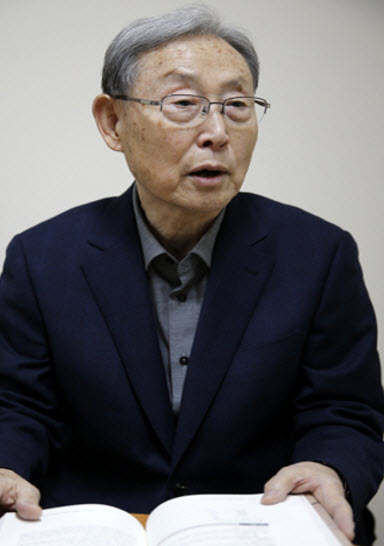
Professor emeritus and linguist JUN Sangbum
Seoul National University professor emeritus and linguist Jun Sangbum has published 12 books since his retirement in 1996. Among these is a Latin textbook called <Introduction to Latin>. He studied the language on his own after his retirement, and for the parts he was uncertain about, he consulted his granddaughter who had actually taken courses in Latin. This book came out seven years ago, but because of fair reception, a revised edition was recently published.
The English Education professor, who will turn 81 this year, started learning Chinese when he was 75 years old, and now he “can somewhat freely converse in Chinese.” With plans to also pick up Greek and Hebrew, he has already bought the necessary textbooks and tapes for self-study.
Latin was the universal language during the Middle Ages. From a linguist’s perspective, it may seem like the natural language of choice. “Both when I was a student and a professor, I attempted many times to learn Latin. I always gave up around the 20th lesson, out of 90. In order to study steadily, I planned to write a book. I wrote it with my granddaughter in a course of six months,” Professor Jun explains.
He was worried upon publication that it would be unpopular and would not sell a single copy, but he was surprised at the result. While working on his revised edition, he conjectured that perhaps because a self-study learner wrote the book, the book’s accessibility contributed to its success.
Professor Jun is a firm believer that language, something we take for granted, will deteriorate just like anything else, if not used often and variedly. He decided to probe deeper into the English language, which he used everyday to teach class, and to explore its roots before limiting himself to a fixed repertoire of words.
“60% of the English language comes from Latin, after all. If you know Latin, then learning English will be much simpler. Spanish, French, and Italian grammar is similar to Latin, and most of its vocabulary comes from it, too. Latin still serves as an archive for new, emerging words. Words like ‘computer,’ ‘virus,’ and ‘bits’ all come from Latin.”
Professor Jun’s passion for language did not start or end with Latin. In fact, his personal history reveals just how familiar he has been with learning new languages all his life.
Professor Jun considers understanding the language the most important factor in understanding the text from a different country. He takes Franz Kafka’s <Metamorphosis> as an example. “Gregor Samsa, who is transformed into a bug, nearly dies because his father throws an apple core at him. The author seeks to portray the weak getting attacked by the strong. The German in this novel is extremely plain. It depicts an ordinary person of weaker standing speaking in an ordinary, conversational manner. In the translations of this text, the reader does not get that feeling at all. If you read the original text in German, you get the sense that this plain person speaking in plain tongue, is getting harassed.”
These days Professor Jun is copying down the New Testament in various languages. He already did so in Chinese, Japanese, and French. He is almost finished with the German version. He has plans to do the same in Latin. And while he is at it, he says that he would also like to learn Greek and Hebrew in particular because “the New Testament is written in Greek, the Old in Hebrew. After resurrection, Jesus Christ asks Peter three times, if he loves Him. In Hebrew, each of the three times, ‘love’ is written in a different way. In English, only one word is repeated.”
These are the quirks of language that draw Professor Jun to his lifelong task. In regards to Korean, Professor Jun suggests that a native language must remain flexible and experimental in its creation of new words, while also maintaining its original roots. “It would be lazy to copy directly from Hanja (traditional Chinese characters). However, just like how we took the Japanese word “Siage” and turned it into “끝손질 (finishing touches),” we must invest continuous effort in being creative with our translations and adoptions.”
Despite his recent diagnosis of failing vision, the elderly professor emeritus’s schedule remains fruitful. In the morning, he starts off the day by translating for three to four hours, and in the afternoon, he studies Latin, Chinese, and French.
“When I was a professor, there was no such thing as a sabbatical. There were many studies I wanted to pursue on my won, but I never had the time. Since retirement, I consider every year to be my sabbatical year,” Professor Jun says.
Written by Ho Jung Annie Hwang, SNU English Editor, annieohan@snu.ac.kr
Reviewed by Eli Park Sorensen, SNU Professor of Liberal Studies, eps7257@snu.ac.kr

